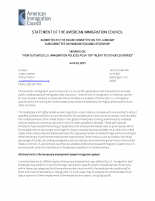- Advocacy
Statement for the House Judiciary Immigration Subcommittee on "How Outdated U.S. Immigration Policies Push Top Talent to Other Countries"
Published
The American Immigration Council submitted a written statement to the House Judiciary Committee's Subcommittee on Immigration and Citizenship for a June 24, 2021, hearing on "How Outdated U.S. Immigration Policies Push Top Talent to Other Countries." The statement shares our analysis of the archaic U.S. immigration policies which are making the United States a less attractive destination for highly skilled workers from other countries. Nations compete with one another to attract qualified professionals from around the world to fill available jobs in key economic sectors. Unfortunately, the competitiveness of the United States in this global marketplace is being undermined by outdated rules and arbitrary numerical caps which have not been updated in decades. These self-imposed limitations have caused the backlog of applications for employment-based visas to grow rapidly, which forces applicants to wait longer and longer for visas to actually become available.
Help us fight for immigration justice!
The research is clear – immigrants are more likely to win their cases with a lawyer by their side. But very few can get attorneys.
Introducing the Immigration Justice Campaign Access Fund.
Your support sends attorneys, provides interpreters, and delivers justice.

Immigration Justice Campaign is an initiative of American Immigration Council and American Immigration Lawyers Association. The mission is to increase free legal services for immigrants navigating our complicated immigration system and leverage the voices and experiences of those most directly impacted by our country’s immigration policies to inform legal and advocacy strategies. We bring together a broad network of volunteers who provide legal assistance and advocate for due process for immigrants with a humane approach that includes universal legal representation and other community-based support for individuals during their immigration cases.

